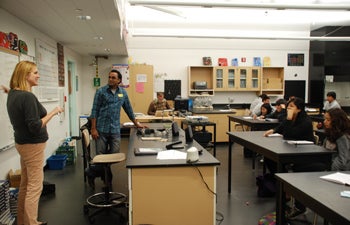Discovering Their Voices
Writing reports on Charles Dickens’ novels, analyzing the theme of 1984 or ascertaining William Shakespeare’s iambic pentameter are assignments high school students have come to expect in their English classes. So, when the opportunity to talk about themselves arose, students jumped at the chance.
Everyone has a story to tell and students in USC College’s Master of Professional Writing (MPW) Program are helping Los Angeles teens write theirs.
“We will say tell us a simple story from your life,” explained Krishna Narayanamurti, an MPW student teaching creative writing at West Adams Preparatory High School.
Narayanamurti is one of four MPW students who have embraced the opportunity to foster teens’ passion for writing through a partnership with PEN Center USA’s PEN in the Classroom (PITC) residency program. PITC has placed the MPW students in high school classrooms where they are responsible for teaching a multi-genre writing course, developing a curriculum, issuing writing prompts, leading lessons, and assigning homework.
The MPW students were inspired to develop and lead their own writing courses after MPW program specialist Ebony Cunningham and faculty member and novelist Gabrielle Pina developed an internship class at Homeboy Industries during Fall 2010 where MPW students led creative writing workshops. When MPW Director Brighde Mullins was asked to join the PEN board she saw that PEN was teaching in the schools in the USC neighborhood.
“As we talked more about PEN in the Classroom it became obvious that the type of program that they were running would be of benefit to the MPW student seeking in-the-classroom teaching experience,” explained Mullins, who recently joined PEN’s Board of Directors. “I thought this was a perfect fit with our graduate writing program, and going to PEN and seeing the foundation of the organization and the passion behind it, I really wanted to reach out.”
Last fall, Justin McFarr and Kristen Abbott taught a creative nonfiction essay course at Film and Theater Arts Charter High School for 12 weeks. Now, once a week for an entire school year, Narayanamurti and Amie Longmire will provide lessons on writing memoirs, monologues, dialogues and the importance of revision to freshman enrolled in West Adam’s Life Skills class.

Freshman learn how to piece together fictional stories during a weekly creative writing lesson. Amie Longmire and Krishna Narayanamurti, students in USC College’s Master of Professional Writing Program will teach the course for one year through a a partnership with PEN Center USA’s PEN in the Classroom (PITC). Photo credit Ambrosia Viramontes-Brody.
“I like teaching because it gets me out and in front of people that I would not normally meet and experiencing life with them makes my writing so much richer,” Longmire explained.
A recent class on fiction writing had students describe their favorite movies. They were asked to identify the film’s characters, context, challenge and change and then encouraged to create their own.
Writing feverishly in their journals, students developed story plots for their characters. From Ninjas in the Middle East to teens navigating their way through the woods, the budding writers weaved together original stories.
Once completed, the teens revealed the tales to their classmates, which for many was the hardest part of the course.
Teresa Meza admitted that reading her work in front of the class is uncomfortable, but it gets easier after the first few lines. She was the first to volunteer to read her memoir “I Was Wrong” for another class assignment.
“My favorite topics to write about are personal memories and animals,” explained Meza, 14. “The memoir was easy for me. It was an experience that took place when I was 11 years old and it just takes me back to the past.”
By the end of the course students will have gained the confidence to not only express themselves on paper, but also out loud. They will share their poems, memoirs, creative stories, and other pieces during a public reading at the end of the school year.
Students will also experience the excitement of seeing their work in print when their work is published by PEN USA as an anthology.
“We don’t determine success based on the number of students who go on to become writers,” said Michelle Meyering, director of programs and events at PEN Center USA. “But we do think it is a tremendous success for students to learn how to convey their personal stories.”
For more information on PITC, visit penusa.org.